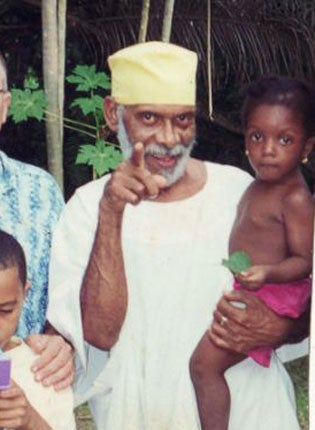Kofi Ghanaba: Drummer who pioneered Afro-jazz

Your support helps us to tell the story
From reproductive rights to climate change to Big Tech, The Independent is on the ground when the story is developing. Whether it's investigating the financials of Elon Musk's pro-Trump PAC or producing our latest documentary, 'The A Word', which shines a light on the American women fighting for reproductive rights, we know how important it is to parse out the facts from the messaging.
At such a critical moment in US history, we need reporters on the ground. Your donation allows us to keep sending journalists to speak to both sides of the story.
The Independent is trusted by Americans across the entire political spectrum. And unlike many other quality news outlets, we choose not to lock Americans out of our reporting and analysis with paywalls. We believe quality journalism should be available to everyone, paid for by those who can afford it.
Your support makes all the difference.Too radical to be properly appreciated during his artistic peak, Guy Warren, or Kofi Ghanaba,was one of the most influential and well-travelled Ghanaian musicians of the mid-20th century.
An early member of E.T. Mensah’s highlife band the Tempos, and later part of the American jazz milieu that included Charlie Parker, Miles Davis and Thelonious Monk, Warren was also a key inspiration for the Nigerian Afrobeat innovator Fela Kuti. He sometimes worked as a DJ, journalist and newspaper editor, and lived in both the UK and the US, pioneering Afro-jazz, an idea based on the reuniting of African-American jazz with its African roots, which was only later taken up by others.
“He was so far ahead of what we were all doing that none of us understood what he was saying,” said the drummer Max Roach, a colleague of Warren’s. “He knew that in order for Afro-American music to be stronger, it must cross-fertilise with its African origins.”
Fascinated from infancy by music – in particular traditional Ghanaian percussion and jazz drumming – he took up kit drums and led his high-school band before joining the Accra Rhythmic Orchestra in 1940. Under Yebuah Mensah, the older brother of E.T. Mensah, they played ballroom music, highlifes and ragtime, soon catering to British and American servicemen in wartime bars.
According to the Accra-based writer and musician Professor John Collins, he was named Gamaliel after Warren Gamaliel Harding, the 29th American president, and later adopted the“Warren” part for his first stage name. In 1943, he was recruited by American military intelligence, travelling briefly to Chicago where he encountered a thriving jazz scene.
Back in Ghana, besides witch-hunting homosexuals in the military for his new employers, he joined the Tempos alongside E.T. Mensah in 1947.
In 1950, he spent nine months with Kenny Graham’s Afro-Cubists in London, where he also DJ’d for the BBC, played with the all-Ghanaian band the Afro-Cuban Eight and mixed with West Indian musicians at Piccadilly’s Caribbean Club.
Reuniting with the Tempos in Accra, he brought fresh musical ideas such as calypso to their nascent highlife sound. However, Warren soon left over musical differences (thus missing out on the band’s massive success of that decade) and formed his own band, the Afro-Cubists. In 1953, they left for Liberia, where Warren also worked in radio.
He returned to Chicago in 1955 and soon immersed himself in the jazz scene there and in New York, releasing his first album (with Gene Esposito and Red Saunders), Africa Speaks, America Answers the following year.
It sold more than a million copies worldwide and spawned his bestknown hit, “That Happy Feeling”, which was also covered by the German artist Bert Kaempfert.
He followed this with a string of groundbreaking (though now unavailable) albums for Colombia, Decca and EMI, such as Themes For African Drums (1958) and Emergent Drums (1963). However, by the mid-1960s, tiring of the racism and critical response he had experienced in the US, he returned to Accra. Once there, he published his autobiography I Have a Story to Tell, and his music returned to traditional African roots, as the 1969/70 recording The Divine Drummer (released on the RetroAfric label in 2002) demonstrates.
During the 1970s, he changed his stage name again, to Kofi Ghanaba (“son of Ghana”) and began playing a kit constructed from enormous fontomfrom and atumpan drums. He reunited with Roach for a 1986 performance at London’s Royal Albert Hall, and also appeared in Haile Gerima’s 1993 film, Sankofa.
In 2001, he made his last UK appearance, in the musical Yaa Asantewaa: Warrior Queen, alongside the Pan African Orchestra and the UKbased dance company Adzido.
Although increasingly reclusive and eccentric, he maintained his African Heritage Library and continued to perform in Ghana until a few months before his death.
Jon Lusk
Gamaliel Kpakpo Akwei (Guy Warren or Kofi Ghanaba), musician: born Accra, Ghana 4 May 1923; married (four sons, two daughters); died Accra 22 December 2008.
Join our commenting forum
Join thought-provoking conversations, follow other Independent readers and see their replies
Comments